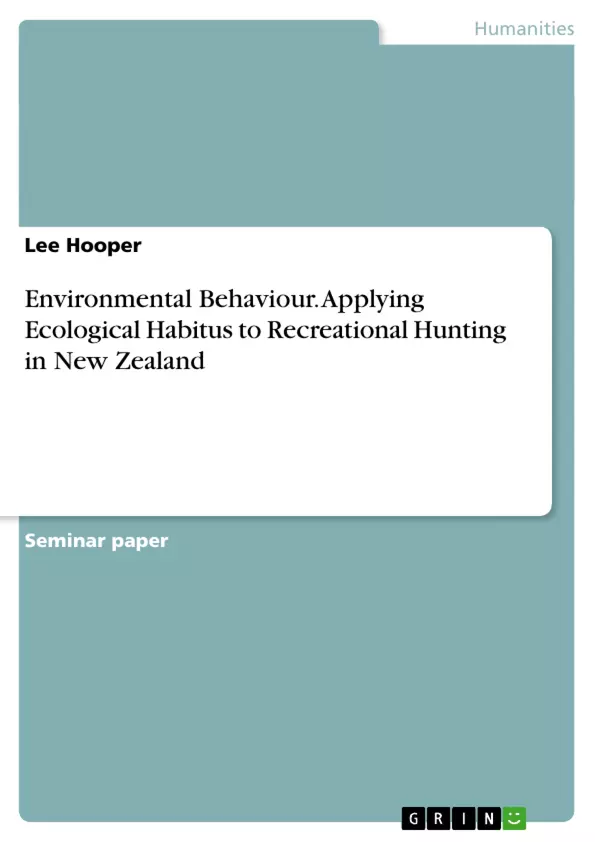The issue of whether recreational hunting hurts or benefits the environment is a controversial topic, with a range of different positions being advocated for. Through applying a socioecological theory that analyses the relational process between humans and the environment, I will argue that the position one takes on hunting, whether it be for or against, is a reflection of their ecological habitus. By outlining a brief history of hunting within New Zealand, my first hunting experience, and defining the key concepts of ecological habitus, I will link my own hunting perceptions and practices to ecological habitus and lay the theoretical foundations that influence an individual’s position on the matter. It will be shown that in New Zealand the ecological habitus towards hunting is heavily influenced by one’s environmental location, type of capital possessed, and identification with a national ‘kiwi’ identity. The impact of this is that the formation of hunting practices is a direct product of the relationships between people and their environment. By applying a concept of ecological habitus a more complex understanding of peoples’ behaviour towards the environment can be gained.
Inhaltsverzeichnis (Table of Contents)
- Introduction
- Hunting in New Zealand
- My First Hunting Experience
- Ecological Habitus
- Ecological Habitus in New Zealand
Zielsetzung und Themenschwerpunkte (Objectives and Key Themes)
This essay explores the relationship between recreational hunting and environmental behavior in New Zealand. By applying the concept of ecological habitus, the essay argues that individual perspectives on hunting are shaped by their relationship with their environment, including their location, social capital, and identification with national identity.
- The historical development of hunting in New Zealand
- The influence of ecological habitus on hunting practices
- The role of national identity in shaping environmental perceptions
- The impact of capital and social structures on hunting behavior
- The relationship between recreational hunting and environmental conservation
Zusammenfassung der Kapitel (Chapter Summaries)
The essay begins by providing a brief history of hunting in New Zealand, highlighting the transition from subsistence-based hunting to recreational hunting. It then describes the author's personal experience with hunting and how it influenced their understanding of ecological habitus.
The following section delves into the theoretical framework of ecological habitus, drawing on Bourdieu's theory of practice and examining the concepts of habitus, field, and capital. It emphasizes how these concepts intersect to influence an individual's environmental perceptions and behaviors.
The final section focuses on the application of ecological habitus to the context of hunting in New Zealand. It explores how national identity, environmental location, and capital accumulation contribute to shaping individual perspectives on hunting and the designation of certain animals as pests.
Schlüsselwörter (Keywords)
This essay focuses on the concepts of ecological habitus, environmental behavior, recreational hunting, national identity, and social capital in the context of New Zealand. It explores the complex relationship between human actions and environmental issues, particularly in the case of hunting practices and perceptions.
Frequently Asked Questions
What is the concept of "ecological habitus"?
Ecological habitus is a socioecological theory that analyzes the relational process between humans and their environment, shaping individual environmental behaviors and perceptions.
How does hunting in New Zealand relate to national identity?
Hunting practices are often linked to a national 'kiwi' identity, influenced by environmental location and social capital, which dictates whether hunting is seen as beneficial or harmful.
Which theoretical framework is used in this essay?
The essay draws on Pierre Bourdieu's theory of practice, specifically the concepts of habitus, field, and capital, applied to an ecological context.
Is recreational hunting considered environmentally friendly in New Zealand?
The topic is controversial; positions for or against hunting reflect the individual's ecological habitus and their relationship with the environment.
What factors influence an individual's position on hunting?
Key factors include geographical location, the type of social capital possessed, and identification with national cultural values.
- Citar trabajo
- Lee Hooper (Autor), 2011, Environmental Behaviour. Applying Ecological Habitus to Recreational Hunting in New Zealand, Múnich, GRIN Verlag, https://www.grin.com/document/233070



